| Listing 1 - 7 of 7 |
Sort by
|
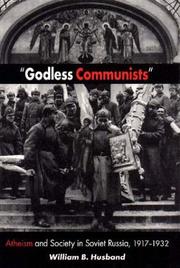
ISBN: 0875802575 Year: 2000 Publisher: DeKalb Northern Illinois University Press
Abstract | Keywords | Export | Availability | Bookmark
 Loading...
Loading...Choose an application
- Reference Manager
- EndNote
- RefWorks (Direct export to RefWorks)
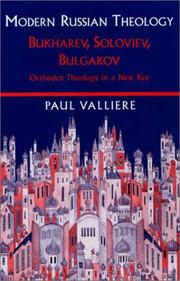
ISBN: 0802839088 9780802839084 Year: 2000 Publisher: Grand Rapids (Mich.) : Eerdmans,
Abstract | Keywords | Export | Availability | Bookmark
 Loading...
Loading...Choose an application
- Reference Manager
- EndNote
- RefWorks (Direct export to RefWorks)
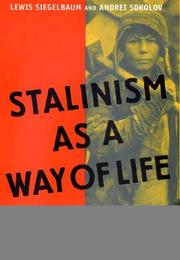
ISBN: 0300084803 Year: 2000 Publisher: New Haven, Conn. Yale University Press
Abstract | Keywords | Export | Availability | Bookmark
 Loading...
Loading...Choose an application
- Reference Manager
- EndNote
- RefWorks (Direct export to RefWorks)
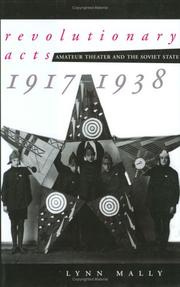
ISBN: 1501707205 1501706985 9781501706981 0801437695 9780801437694 9781501707209 1501706977 9781501706974 Year: 2000 Publisher: Cornell University Press
Abstract | Keywords | Export | Availability | Bookmark
 Loading...
Loading...Choose an application
- Reference Manager
- EndNote
- RefWorks (Direct export to RefWorks)
During the Russian Revolution and Civil War, amateur theater groups sprang up in cities across the country. Workers, peasants, students, soldiers, and sailors provided entertainment ranging from improvisations to gymnastics and from propaganda sketches to the plays of Chekhov. In Revolutionary Acts, Lynn Mally reconstructs the history of the amateur stage in Soviet Russia from 1917 to the height of the Stalinist purges. Her book illustrates in fascinating detail how Soviet culture was transformed during the new regime's first two decades in power.Of all the arts, theater had a special appeal for mass audiences in Russia, and with the coming of the revolution it took on an important role in the dissemination of the new socialist culture. Mally's analysis of amateur theater as a space where performers, their audiences, and the political authorities came into contact enables her to explore whether this culture emerged spontaneously "from below" or was imposed by the revolutionary elite. She shows that by the late 1920s, Soviet leaders had come to distrust the initiatives of the lower classes, and the amateur theaters fell increasingly under the guidance of artistic professionals. Within a few years, state agencies intervened to homogenize repertoire and performance style, and with the institutionalization of Socialist Realist principles, only those works in a unified Soviet canon were presented.
Amateur theater --- History. --- Amateur plays --- Amateur theatricals --- Nonprofessional theater --- Women in amateur theatricals --- Amusements --- Theater --- Little theater movement --- History and criticism --- History --- Amateur theater - Soviet Union - History --- theatre --- socialist realism --- amateur theatre --- agitprop --- Russian revolution --- Soviet Union --- Leningrad Theatre of Working Class Youth
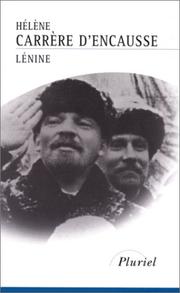
ISBN: 2012789633 9782012789630 Year: 2000 Volume: 963 Publisher: Paris: Hachette,
Abstract | Keywords | Export | Availability | Bookmark
 Loading...
Loading...Choose an application
- Reference Manager
- EndNote
- RefWorks (Direct export to RefWorks)
Lenin, Vladimir Ilʹich, --- Communists --- Heads of state --- Revolutionaries --- Biography --- Soviet Union --- History --- Communists - Soviet Union - Biography --- Heads of state - Soviet Union - Biography --- Revolutionaries - Soviet Union - Biography --- Lenin, Vladimir Ilʹich, - 1870-1924 --- Soviet Union - History - 1917-1936 --- U.R.S.S. --- Lénine, Vladimir Iliitch (1870-1924) --- RUSSIE --- HISTOIRE --- Biographie --- 20E SIECLE

ISBN: 1280329556 113458153X 0203171594 0203130936 9780203171592 9780203130933 0415230411 9780415230414 041523042X 9780415230421 0203179978 9780203179970 9781280329555 9781134581481 9781134581528 9781134581535 1134581521 1933305916 9781933305912 Year: 2000 Publisher: London: Routledge,
Abstract | Keywords | Export | Availability | Bookmark
 Loading...
Loading...Choose an application
- Reference Manager
- EndNote
- RefWorks (Direct export to RefWorks)
The Superpowers traces the development of the USA and Russia (later USSR) from 1898 through to 2000, placing the Cold War, from inception to ending, into the wider social, economic and political context. This is the first history of the two major participants and their relationship throughout the twentieth century.The Superpowers: explores the intertwining history of the two powers chronologically and includes discussion of: * the inheritance of the two great powers and their imperial background * World War One and the Russian Revolution * Capitalism and Soci
Cold War. --- Imperialism. --- United States - History. --- Imperialism --- Cold War --- United States - General --- Regions & Countries - Americas --- History & Archaeology --- World politics --- History --- United States --- Russia --- Soviet Union --- History. --- Foreign relations. --- Foreign relations --- Imperialism - History --- United States - History --- Russia - History --- Soviet Union - History --- United States - Foreign relations --- Russia - Foreign relations --- Soviet Union - Foreign relations
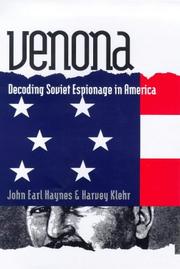
ISBN: 1281722227 0300129874 9786611722227 0585378924 9780585378923 9780300129878 9781281722225 9780300077711 0300077718 0300084625 9780300084627 Year: 2000 Publisher: New Haven [Connecticut]
Abstract | Keywords | Export | Availability | Bookmark
 Loading...
Loading...Choose an application
- Reference Manager
- EndNote
- RefWorks (Direct export to RefWorks)
Only in 1995 did the United States government officially reveal the existence of the super-secret Venona Project. For nearly fifty years American intelligence agents had been decoding thousands of Soviet messages, uncovering an enormous range of espionage activities carried out against the United States during World War II by its own allies. So sensitive was the project in its early years that even President Truman was not informed of its existence. This extraordinary book is the first to examine the Venona messages-documents of unparalleled importance for our understanding of the history and politics of the Stalin era and the early Cold War years. Hidden away in a former girls' school in the late 1940's, Venona Project cryptanalysts, linguists, and mathematicians attempted to decode more than twenty-five thousand intercepted Soviet intelligence telegrams. When they cracked the unbreakable Soviet code, a breakthrough leading eventually to the decryption of nearly three thousand of the messages, analysts uncovered information of powerful significance: the first indication of Julius Rosenberg's espionage efforts; references to the espionage activities of Alger Hiss; startling proof of Soviet infiltration of the Manhattan Project to build the atomic bomb; evidence that spies had reached the highest levels of the U.S. State and Treasury Departments; indications that more than three hundred Americans had assisted in the Soviet theft of American industrial, scientific, military, and diplomatic secrets; and confirmation that the Communist party of the United States was consciously and willingly involved in Soviet espionage against America. Drawing not only on the Venona papers but also on newly opened Russian and U. S. archives, John Earl Haynes and Harvey Klehr provide in this book the clearest, most rigorously documented analysis ever written on Soviet espionage and the Americans who abetted it in the early Cold War years.
Espionage, Soviet --- Communism --- Spies --- Cryptography --- Cryptanalysis --- Cryptology --- Secret writing --- Steganography --- Signs and symbols --- Symbolism --- Writing --- Ciphers --- Data encryption (Computer science) --- Agents, Secret --- Intelligencers (Spies) --- Operatives (Spies) --- Secret agents --- Spooks (Spies) --- Spying --- Subversive activities --- Espionage --- Secret service --- Bolshevism --- Communist movements --- Leninism --- Maoism --- Marxism --- Trotskyism --- Collectivism --- Totalitarianism --- Post-communism --- Socialism --- Village communities --- Soviet espionage --- History --- Communist Party of the United States of America --- Workers (Communist) Party of America --- Communist Party of America --- Communist Political Association --- Progressive Labor Movement (Brooklyn, New York, N.Y.) --- CPUSA --- Communist Party of the United States --- Kommunisticheskai︠a︡ partii︠a︡ SShA --- Mei-kuo kung chʻan tang --- Communist Party, U.S.A. --- Amerikan Komünist Partisi --- American Communist Party --- Partido Comunista de los Estados Unidos --- KP der USA --- K.P. der U.S.A. --- Kommunistische Partei der USA --- Kommunistische Partei der U.S.A. --- Ḳomunisṭishe parṭey der Fareynigṭe Shṭaṭn --- Communist Party USA --- קאמוניסטישער פארטיי פון די פאראייניקטע שטאטן --- קומוניסטישער פארטיי, פערייניקטע שטאטן --- Yhdysvaltain Kommunistipuolue --- Communist Party of the United States of America -- History -- Sources.. --- Espionage, Soviet -- United States -- History -- Sources.. --- Communism -- United States -- History -- Sources.. --- Spies -- Soviet Union -- History -- Sources.. --- Spies -- United States -- History -- Sources.. --- Cryptography -- United States -- History -- Sources.
| Listing 1 - 7 of 7 |
Sort by
|

 Search
Search Feedback
Feedback About UniCat
About UniCat  Help
Help News
News